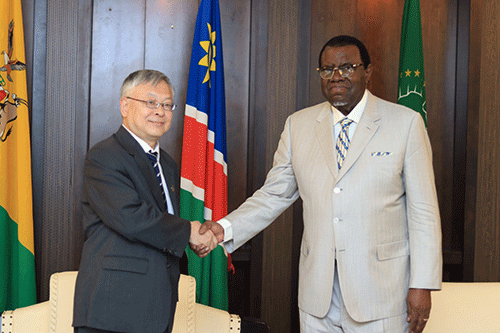United Nations resident coordinator to Namibia, Sen Pang recently highlighted key roles and achievements of the UN in Namibia at the UN Day celebration. He said UN Day offers an opportunity to amplify the common agenda and reaffirm the purpose and principles of the UN Charter. The resident coordinator is the highest UN official in Namibia, and it functions as the direct representative of the UN Secretary General. Pang’s tenure comes to an end in November.
NE: What is the sole purpose of UN Day?
SP: UN Day is an opportune time to take stock of what we have accomplished as UN Namibia, celebrating development milestones and reflecting on our aspirations to continue the work of materialising the Sustainable Development Goals (SDGs).
NE: What is the ultimate role of the UN, especially in countries like Namibia?
SP: Our world is in turmoil, and we continue to face an unprecedented economic, environmental and humanitarian crisis. Our organisation is tested like never before. The UN was made for moments like this: to reinforce peace to reach those left furthest behind and to transform our environment for future generations. More importantly, we have a responsibility to bring to life the values and principles of the UN Charter in every corner of the world.
NE: How has your experience and journey in Namibia been?
SP: My journey at UN Namibia will come to an end this November. When I started here, it was at the height of the Covid-19 pandemic that ravaged the country and the world. Indeed, the pandemic proved that the power of collaboration was vital in fighting the pandemic and walking a tightrope to balance the many variables of the economy, health, the loss of life and the impact on education. Looking back, the UN indeed mobilised resources and was agile to respond to the crisis and provide the necessary support to the government of Namibia. It is in times of crisis that we see where our true strength lies and where the gaps lie that we need to address.
My tenure at UN Namibia has been an inspiring experience. I am grateful and humbled for this opportunity to lead an organisation, which is a partner of choice to the government of Namibia. Allow me to express my gratitude to all our partners, to the UN Namibia country team and the UN Namibia family, the government of Namibia and importantly to the people of Namibia. My love for your country will be with me always. It has been an honour to serve you.
NE: Please highlight key areas the UN has been busy with in Namibia.
SP: To ensure inclusive development and poverty reduction for vulnerable groups, 138 hectares of land were availed to beneficiaries for farming. We have trained young people with disabilities from four regions in horticulture. Close to half a million US$ was allocated to support locust control in the country, while 34 430 children were screened monthly for acute malnutrition, and 3 000 people were provided with temporary mobile toilets and safe access to water. The UN was able to support 607 women and girls with long-term contraceptive devices. Sixty-two per cent of students were enrolled to complete TVET level three, teachers in 66 schools received training in disability, while 300 pre-primary novice teachers were trained in early literacy and numeracy skills. One hundred and fifty-six people were trained in community forest management in nine northern regions. Around 2 700 households were aided with commodity vouchers in the Kunene and Ohangwena regions. About 172 GBVPUs and justice professionals were trained in child witness training for child-sensitive investigations.
NE: For these projects to be successful, partnership is key. Please outline the importance of such partnerships.
SP: The spirit of partnership has provided us with the momentum and the means to push beyond the boundaries to reach vulnerable populations and groups. Through our respective achievements, we have been able to deliver the ethos of partnership, a fundamental building block of the SDGs.
NE: How much has been spent on the projects here in Namibia?
SP: The UN in Namibia has jointly spent close to US$16 million (N$293 million), across six pillars outlined in our UNPAF – these pillars guide our work that is closely aligned with national government priorities and strategic guiding documents for Namibia’s development agenda. Our specialised agencies, programmes and funds have worked in conjunction with various actors to operationalise projects, which have served the Namibian people.
NE: How is Namibia doing regarding achieving the SDGs?
SP: We are lagging in accomplishing the SDGs, an ambitious global agenda, with a deadline set for 2030. With less than eight years to transform our worlds and achieve our goals, I would like to use this opportunity to call upon our partners and stakeholders on the urgency for us to unite to accelerate sustainable solutions on the ground that will directly impact and transform the lives of communities. We have a shared responsibility to deliver the extraordinary. The 2030 Agenda is our roadmap for the world we all want. The global goals are our best hope for people, the planet, prosperity, peace and partnerships.
NE: Any last thoughts?
SP: We affirm our commitment to the people of Namibia and the UN Namibia’s continued solidarity to maximise the gains and accelerate change in Namibia for Namibians.



